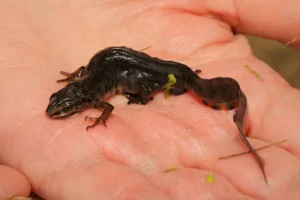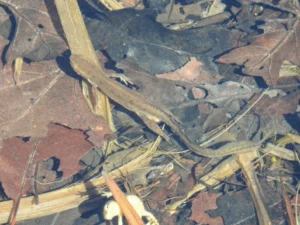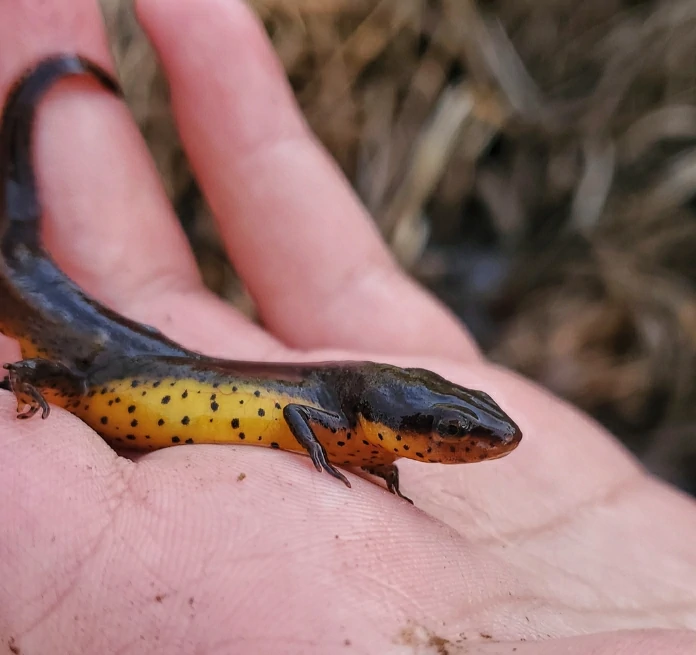If you’ve ever picked up a newt, you’ve probably noticed their skin feels different from most animals. It’s smooth, wet, and sometimes a little sticky. But why does it feel that way? Do newts really have sticky skin?
Newts don’t have glue-like skin, but their skin is covered in a slimy mucus that can feel sticky to the touch. This slime isn’t just for looks, it’s an important part of how they survive. It keeps them damp, protects them from germs, and even helps them slip away from predators.
How Newt Skin Works
Newts have thin skin that water, oxygen, and other substances can pass through.
They don’t have fur or thick protective layers like mammals do. To protect themselves, they make a slimy coating of mucus.

This mucus sometimes feels sticky when you touch a newt, especially if it’s stressed or being handled.
That stickiness is actually a good sign, it means the skin is working the way it should, keeping the newt healthy in damp places.
Imagine touching a newt right after it swims in a pond. Its skin might feel tacky, almost like soft jelly. That’s the mucus layer doing its job.
Why Mucus Is So Important for Newts
That slimy coating does a lot more than just make them feel sticky:
-
Moisture retention: Newts need to stay damp so they can breathe through their skin.
-
Protection from bacteria and fungi: The mucus blocks germs that could make them sick.
-
Predator defense: Some newts have mild toxins in their mucus that taste bad to predators.
So when you feel that stickiness, it’s not random, it’s how they stay alive on land and in water.
Is the Stickiness the Same in All Newts?
Not every newt feels the same. Different species make more or less mucus, and it can also change with the weather or stress.
For example:
-
Smooth newts usually feel slippery with just a little tackiness.
-
Eastern newts may feel stickier, especially in their red eft stage, because they release stronger protective slime.

Even the same newt can feel different at times. On dry days the mucus can feel more sticky, while in a pond it can feel more slippery.
How the Skin Helps Newts Escape Predators
That slimy coating is like a built-in escape tool. Birds, fish, and other predators’ may have trouble holding onto a sticky, slippery newt.
Some predators even stop trying because the mucus tastes bad or is mildly toxic.
Picture a fish snapping at a newt in a shallow pond. Instead of being caught, the newt’s slimy body slides right out of the fish’s mouth.
That sticky feel is really a survival trick.
Does the Mucus Have Chemicals?
Yes, the slime is more than just moisture. It contains chemicals that help the newt survive:
-
Toxins: Some, like red efts, make powerful poisons that ward off predators.
-
Antimicrobial compounds: These protect the skin from infections.
-
Scent cues: They release signals during mating to communicate with other newts.
These chemicals are part of why the skin can feel sticky. It’s not glue, it’s protection and communication all rolled into one.
How Newts Keep Their Skin Healthy
Because their skin does so much, newts take steps to protect it:
-
They stay in damp places like ponds, soil, or under leaves to avoid drying out.
-
They avoid rough surfaces that could tear their skin.
-
They clean themselves by swimming or rubbing against smooth surfaces.

All of this helps keep their slimy coat in good shape.
Can You Touch a Newt’s Sticky Skin?
Yes, but you need to be careful:
-
Wet your hands first so you don’t hurt the skin.
-
Be gentle and avoid squeezing.
-
Wash your hands afterward since some newts have mild toxins.
Even short contact can remove some of their mucus, which stresses them out. Often, it’s better to just watch them instead of picking them up.
How Newts Compare to Other Amphibians
Lots of amphibians have slimy skin, but newts are a little different. Frogs usually feel very slippery, and salamanders’ skin varies.
Newts combine a bit of stickiness, protective chemicals, and even communication signals through their mucus.
It’s a clever little system that works perfectly for their lifestyle.
Conclusion
So, do newts have sticky skin? Yes, their mucus can feel sticky, but it’s much more than that.
It keeps them damp, protects them from sickness, helps them slip away from predators, and even lets them send signals during mating.
Next time you see a newt, notice how its skin feels smooth and a little sticky. That slimy coating isn’t just a texture, it’s a survival system built for life both in water and on land.
Hi, my name is Ezra Mushala, i have been interested animals all my life. I am the main author and editor here at snakeinformer.com.

